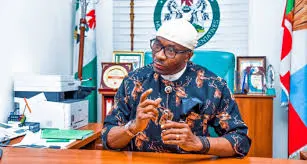By Paul Effiong, Abuja
Bill seeking the creation of an Act to alter the constitution to establish the National Local Government Electoral Commission, as an independent body responsible for conducting and supervising election into the position of chairmen, vice chairmen and councilors of all the local government councils, have scaled second reading in the House of Representatives.
The proposed law is sponsored by the Deputy Speaker, Benjamin Kalu and eight other lawmakers.
During Tuesday’s plenary, the bill was presented for second reading by the House Leader, Julius Ihonvbere.
According to proponents of the expected law, the commission, when established, will ensure the credibility, transparency and fairness of local government elections, as well as promote democratic governance at the grassroots.
The bill’s synopsis revealed that the National Local Government Electoral Commission shall consist of a chairman and 37 other members representing the 36 states of the federation and the Federal Capital Territory, FCT.
It also states that the chairman, who shall be the chief electoral officer, and members of the board shall be appointed by the president on the recommendations of the National Council of State and subject to the confirmation of the Senate.
The commission is expected to provide periodic reports on its activities and the outcome of local government elections to the president, National Assembly and the general public, thereby promoting transparency and accountability in its operations.
“Alteration of the Constitution Cap C23 Laws of the Federation of Nigeria 2004.The Constitution of the Federal Republic of Nigeria Cap C.23 Laws of the Federation of Nigeria 2004 (in this Bill referred to as the ‘Principal Act’) is altered as set out in this Bill. Alteration of section 153 of the Principal Act.
“The commission shall be responsible for: (a) organising, conducting and supervising elections into the offices of chairmen and councilors of all local governments in the federation, including area councils of the Federal Capital Territory; (b) setting the election timetable, managing polling processes, and ensuring compliance with electoral laws; (c) overseeing the registration of voters for local government elections, maintain an accurate and up-to-date voter register, and ensure that eligible citizens are provided with access to participate in the electoral process.
“(d) Regulating and monitoring the activities of political parties, candidates, and other stakeholders during local government elections to ensure compliance with campaign finance laws, electoral codes of conduct, and other relevant regulations; (e) designing and implementing voter education programmes to inform and sensitize the public about the importance of local government elections, their roles and responsibilities as voters, and the electoral process, fostering active participation and reducing voter apathy; and (f) carrying out other responsibilities as may be assigned to the commission in an Act of the National Assembly.
“The secretary of the board of the National Local Government Electoral Commission shall be appointed by the president on the recommendation of the Board of National Local Government Electoral Commission who shall be a legal practitioner of not less than 10 years,” Ihonvbere said in his lead debate.
Also at plenary, the lawmakers passed through second reading, a Bill for an Act to alter the Constitution of the Federal Republic of Nigeria 1999 to specify the time within which the executive shall present to the National Assembly, any treaty between the federation and any other country for enactment.
The proposed law also states that such treaty shall be presented to the National Assembly for enactment not later than 180 days thereafter.





